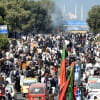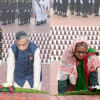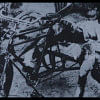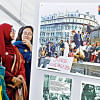Bangladesh's journey beyond Cold War realpolitik

Today marks the first Victory Day of Bangladesh being celebrated without the existence of Henry Kissinger. Despite the seemingly provocative nature of this statement, Kissinger's passing in early November signified the end of an era characterised by the spectre of Cold War realpolitik. In a changed world, our V-Day opens up new avenues for retrospectively examining our past and understanding our victories in a contingent manner. It prompts us to engage with the narratives that conditioned our victory, try to understand the conditions of our victory, and both identify and outline the emerging necessities.
In an obituary in The New York Times, the author stated, "... He [Kissinger] was by turns hailed as an ultrarealist who reshaped diplomacy to reflect American interests and denounced as having abandoned American values, particularly in the arena of human rights, if he thought it served the nation's purposes."
On our last Independence Day, US President Joe Biden sent a message to remind us "of the deep value both of our nations' people place on democracy, equality, respect for human rights, and free and fair elections." The message ended with a "Joy Bangla" slogan, and charted a long list of items: "The United States and Bangladesh have achieved a lot together—advancing economic development, strengthening people-to-people ties, addressing global health and climate issues, partnering on the humanitarian response to Rohingya refugees, and committing to a prosperous, secure, democratic, and independent Bangladesh."
This shift represents a moral triumph for a nation whose suffering was largely overlooked by numerous world leaders during its inception. Both the US and China perceived our struggle for freedom—which claimed millions of lives—merely as a civil war. Even India, while responding to the humanitarian crisis sparked by Pakistan's genocidal onslaught, initially considered it the third India-Pakistan war and strategised to secure its eastern border. However, we express gratitude to India for its military and diplomatic assistance, supported by the Soviet Union. Without their support, the envisioned path of victory, initiated by Bangabandhu Sheikh Mujibur Rahman, would have been longer and more uncertain.
Overcoming enemy forces isn't the sole definition of victory. If that were the case, the surrender of 90,000 Pakistani soldiers at the Ramna Race Course ground would have unequivocally sealed our triumph. For us to claim victory, Bangabandhu's return was crucial as it bridged the gap between his articulated aspirations in the March 7 speech and the war's outcomes. It was essential to demonstrate to the world that the pre-war civil disobedience had been our assertion of rights—our rights to safeguard our language, ways of life, jobs, and future as Bangalees. Following our victory, the world retrospectively recognised that these "brown Muslims" are more than a "basket case." A country the size of Illinois and a population surpassing Russia's can indeed be a significant player in the region, given its strategic geopolitical location atop the Bay of Bengal and demographic advantage in supplying human capital.
The divergence of US public policies from the general empathy of the American people during our Liberation War offers instructive insights. Independent politicians like Senator Edward Kennedy, events such as the Concert for Bangladesh in Madison Square, or the poetic protest against the horrors of war by Allen Ginsberg all influence the endorsement of US-American values, which are not solely shaped by political actors.
The US largely ignored the genocide unleashed by the junta they supported in West Pakistan. Henry Kissinger, the national security adviser to then US President Nixon, disregarded repeated appeals sent by their consul general stationed in Dhaka. Archer Blood dispatched a series of messages to warn Washington that Bangladesh's independence was inevitable, urging the US to cease support for West Pakistan. Kissinger dismissed these telegrams, remarking, "That consul in Dacca doesn't have the strongest nerves." Nixon and Kissinger devised plans to supply arms to Pakistan through Jordan and other Middle Eastern countries to prevent India from overpowering them.
Archer Blood was disgusted by his government's "moral bankruptcy" as Yahya Khan unleashed "the most incredible calculated thing since the days of the Nazis in Poland." At the start of the all-out war—militarily codenamed Operation Searchlight—Yahya Khan infamously said, "Kill three million Bengalis, and the rest will eat out of our hands." His predecessor, Ayub Khan, characterised Bangalees as "conquered peoples, while the inhabitants of West Pakistan were the descendants of conquerors." Pakistan's domination of its eastern wing was steeped in racial prejudice and pre-partition communal rhetoric.
It took someone like US Beat poet Allen Ginsberg to walk through the refugee camp in Kolkata and witness the trail of tears on Jashore Road to point out, "Millions of souls—nineteen seventy-one homeless on Jessore Road under grey sun// A million are dead." And he urged the US-American public: "Ring O ye tongues of the world for their woe/ Ring out ye voices for Love we don't know// Ring out ye bells of electrical pain/ Ring in the conscious of America brain."
It took artists like Ravi Shankar, George Harrison, Bob Dylan, Joan Baez, Eric Clapton, and others to vocalise the identity of an unborn nation, accentuating its birth pangs. Freedom fighter and actor-director Aly Zaker had said, "The voice that was raised about Bangladesh and the sufferings of humanity reached all corners of the world."
George Harrison's response to his friend Ravi Shankar's humanitarian appeal resonated profoundly in the counterculture of the 1960s, marked by the lingering memories of the Atom Bomb and the Vietnam War.
In the West, people became awakened to our just demands for victory. Their financial, spiritual, and political support added another dimension to our ongoing war. The amalgamation of Western and Eastern music in the concert moved the US-American people to perceive the broader face of humanity. Our victory encompassed their evolving mood, influenced by both political and military elites, and extended to US associates at home and abroad.
Ironically, the concert also etched an image of a malnourished child, featured on the record cover, as a symbol distant from the golden Bengal promised. For a long time, we had to fight off being imaged as an aid-dependent country before reaping the benefits of independence and becoming self-sufficient.
Victory Day provides an opportunity for contemplation on the consequences and aspirations of victory. The secular, democratic aspirations with which the country commenced had to encounter numerous challenges. Five decades later, we can celebrate Bangabandhu's words on his homecoming day: "Together we will build a new and prosperous Bengal. The people of Bengal will rejoice, live life in joy, and breathe freely in the open air. The people of Bengal will have two square meals a day. All my endeavours are aimed at achieving this goal. In fact, establishing the country on a firm financial footing is the motto of my life."
We can declare that one outcome of our victory has been achieved only when we can correspond with the stated aspirations.
Dr Shamsad Mortuza is professor of English at Dhaka University.
Views expressed in this article are the author's own.
Follow The Daily Star Opinion on Facebook for the latest opinions, commentaries and analyses by experts and professionals. To contribute your article or letter to The Daily Star Opinion, see our guidelines for submission.

 For all latest news, follow The Daily Star's Google News channel.
For all latest news, follow The Daily Star's Google News channel. 












Comments